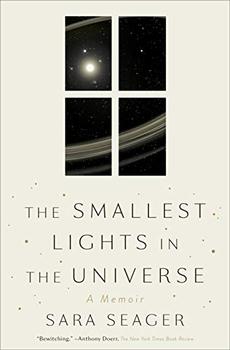Summary | Excerpt | Reading Guide | Reviews | Beyond the Book | Readalikes | Genres & Themes | Author Bio

A Memoir
by Sara Seager
When we first lived in the Annex, we attended a Montessori school far outside town, near the distant house we'd called home before my mother and father separated. I don't know why we stayed in the same school after our move into the city, but our commute was over an hour each way, including trips on two buses and the subway, with long waits at busy stations and platforms in between. Jeremy was maybe eight at the time, which would make me seven and Julia five. After a few weeks of trial runs, we made that trip every day on our own.
Jeremy would save up a pocketful of coins until he had enough to buy a bag of sour-cream-and-onion chips, which we would carefully share. Just the smell of those chips today puts me back on those buses and subways. We filled time by reading newspapers—discarded by adults, or stolen out of the newspaper box after somebody bought one, before the door could slam shut—which I suppose was a positive. We were what modern educators would call "advanced."
One day my sister fell into a muddy puddle at the bus stop that marked the start of our long journey home. After a tearful ride, a woman saw Julia still crying at the subway station and brought her into the women's washroom to clean her up. She took forever, and I shuttled back and forth giving updates to my brother, who stood worried sentry outside. I try to imagine that scenario now—a woman finding three kids under eight on their own, one of them crying and covered in mud. I think today, most of the time, the story ends with a call to the police. In our case, it ended with a stranger putting my five-year-old sister slightly back together before we boarded the subway into the city.
I have memories that left more lasting damage. My stepfather was a monster, the kind of beast who normally lives at the dark heart of a fairy tale. He didn't physically abuse me, but he could be unbelievably cruel, and his mood swings were vicious. I lived in constant fear of setting him off.
He and my mother were both still in bed when we left for school, having scratched together our own breakfast, our own lunch. He didn't work, and my mother's writing career wasn't exactly lucrative, either. My father told me he suspected our entire family survived on his child support payments. When my mother and stepfather had a child together, my half sister, money was so tight that I wondered whether six of us were living off child support meant for three. Julia and I had to share our already cluttered room with the baby. She cried all night for months with colic, and she would wake up at dawn for a long time after, my mother ignoring my pleas to cover our east-facing windows. I was forever getting up to take care of the baby.
When I was nine years old, I decided not to walk with Julia to school one morning. (We had left the Montessori at that point, but our new school was still a mile-long walk away.) She would have been seven. I wanted to walk with one of my few semi-friends and didn't want my little sister tagging along, so I told her to find her own way. Instead of taking the safer, quieter side streets, she took the main roads. At one especially busy corner, she was confronted by an unstable woman who howled in her face and tried to hit her with her bags. Julia froze and screamed for help. It took a long time for anyone to answer her cries. A real estate agent finally surfaced from a nearby office to rescue her. For days after, teachers at our school would ask me what had happened. "Not sweet Julia!" They were in shock.
"You are in so much trouble," my stepfather screamed at me when I got home. I can't remember exactly what he said after that, but these are the words I hear when I close my eyes: You are a bad person. What were you thinking? You are so irresponsible. You are an ungrateful child, and I am furious with you.
I should have looked after my sister. But I was also nine years old. That night I was the one who woke up crying.
Excerpted from The Smallest Lights in the Universe by Sara Seager. Copyright © 2020 by Sara Seager. All rights reserved. No part of this excerpt may be reproduced or reprinted without permission in writing from the publisher.
Asking a working writer what he thinks about critics...
Click Here to find out who said this, as well as discovering other famous literary quotes!
Your guide toexceptional books
BookBrowse seeks out and recommends the best in contemporary fiction and nonfiction—books that not only engage and entertain but also deepen our understanding of ourselves and the world around us.